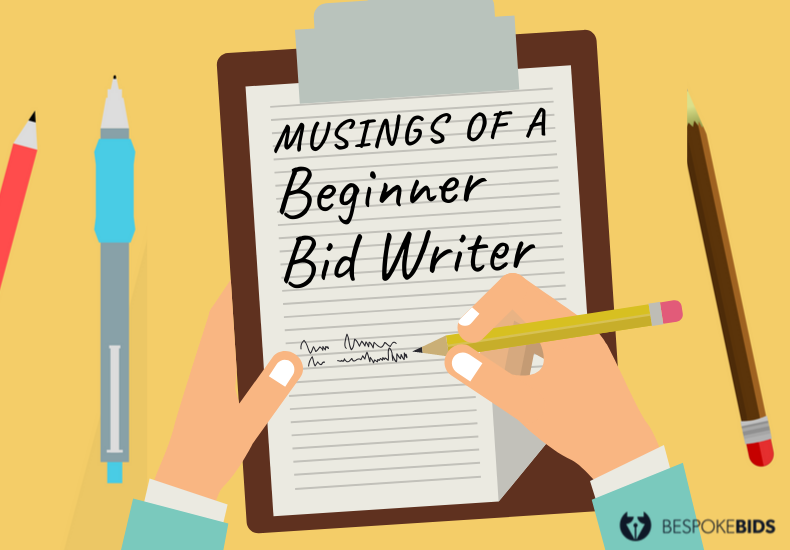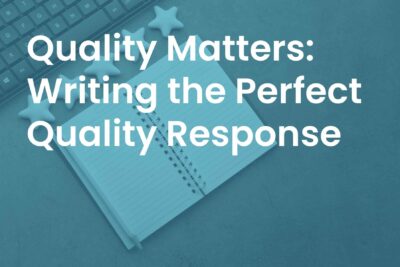
Why Bid Writing?
Until four weeks ago I had no idea what a bid writer was. Nor, like much of the public, did I imagine that such a role even existed. I was a naïve university graduate who had spent the last three years arguing whether Caesar really was a bad guy or not, and that History actually was a useful subject. Consequently, and with little real understanding, I chose to apply to become a bid writer as producing well-reasoned arguments seemed like a good match for my degree.
Two weeks into my new job as a ‘Graduate Trainee Bid Writer’ I now understand the important role that bids, and those who write them, play in a whole host of public sector services. From hospital beds, to school catering, to toilet paper and tissues, it is most likely that if you have ever used any of these in a public building, a company has had to compete to supply it. This is because the government has put in place a comprehensive Bid process to ensure that their suppliers and contractors not only work for a competitive price, but that they guarantee quality, reduce damage to the environment and give back to the communities whose tax money will be paying them. These ‘Qualitative’ aspects often determine the outcome of a bid far more than the cost does. Money, it turns out, isn’t everything.
First Impressions
After reading some bids in the first few days in my new job, my first impression was that they were essentially job interviews, but for companies, not individuals. This might seem like a simplistic parallel to draw, after all what does my stint working in a supermarket have to do with a construction company’s noise complaints policy? However, in both cases the interviewer, or buyer, wants to know what experience you have of dealing with clients, addressing their problems, and reaching a satisfactory conclusion for all parties.You might not think that you have a policy on customer service, but in an interview if asked how you would deal with a problem customer, you would have an answer prepared, even if not written down.
Just as in an interview, the bulk of a bid is explaining why your company has the right kind of experience to fulfil a contract. A Buyer is also interested as to why you are better placed to deliver than your competitors.
Things I’ve Learned
Writing a bid is in many ways like writing an essay for university, they even have mark schemes. However the usual waffle you might include in order to fill up the word count is definitely not allowed. The buyer’s have to sift through hundreds of responses and so don’t want to know the history of your company. Nor do they want to see how many fancy words you can sneak in. They want clear and concise reasons as to why your company is the better choice for them. If you have to use bullet points to demonstrate that to them, then you can.
You also learn that you have to be innovative to stand out from the crowd. Explaining why your company’s method for cleaning floors is revolutionary may seem difficult. However, it’s an important aspect of your bid and one the buyer will definitely be paying attention to.
Creativity is therefore essential. Many companies don’t have detailed policies or statements providing evidence of their previous hard work. Most will have a procedure, or an idea of these things. But it is our job to transform those into responses that encompass the buyer’s precise requirements.
It’s important, however, that your arguments don’t enter the realm of marketing. Buyers don’t want to hear generic statements about how you are the ‘best on the market’ or an ‘industry leader’. The bid process you go through is the same regardless. As is the evidence you have to supply to back such bold claims.
Consulting Confusion
I’ve also realised why the profession dedicated to Bid writing exists at all. For many of the uninitiated, myself included, the task, when first presented, appears incredibly daunting. Bidders have to contend with a whole host of confusing abbreviations, from SSQs to ITTs, to RFIs and PAS91s, along with enormous tender documents that include seemingly endless clauses and criteria. That’s before bidders have to answer a questionnaire around seventy questions long that probes every aspect of their business. From there, a bidder must then submit a number of essay-like questions with word counts and mark schemes reminiscent of a school exam. Except the buyer wants to know what your Health and Safety protocols are. It’s also an exam where your fellow sitters are in direct competition with you.
Many of our clients come to us because they are understandably baffled by bids. Our role as bid writers is to cut through the red tape, identify the key aspects of the bid and then sit the ‘exam’ on their behalf.
The Payoff
Although I am yet to sit one of my own, I am learning how to deliver the best quality responses so that our clients have the best chance of success. Very few roles place the future success of a company into someone else’s hands. It makes sense therefore that I have to do significant work to get to the standard where I am given that responsibility. When I finally am, I know the process will be incredibly rewarding as I will have made a quantifiable difference to someone’s business.
Did you enjoy this post?
Check out one of our latest blogs on being ready for tendering.
Follow Bespoke Bids on Linkedin to keep up with our day-to-day operations. We post live tenders, tips and tricks and more.


